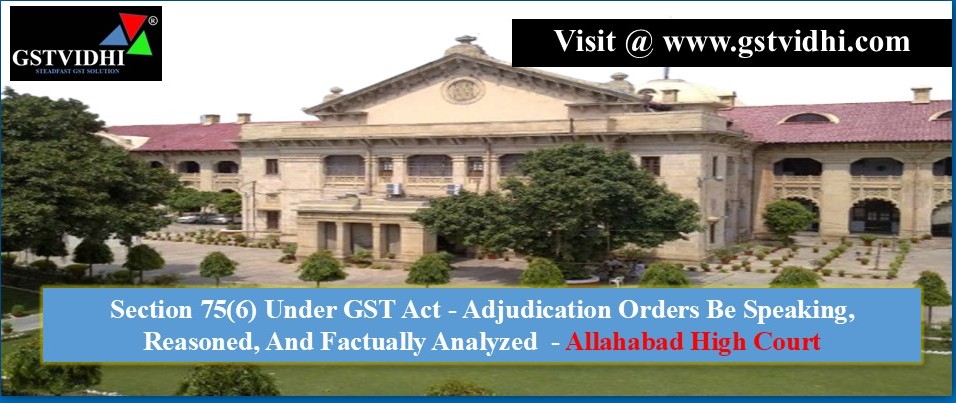
Section 75(6) Under GST Act - Adjudication Orders Be Speaking, Reasoned,
And Factually Analyzed - Allahabad High
Court
F K
Fancy Zari Art v. Union of India & Others /Writ Tax No. 2869 of 2025 | Decided on 25 June 2025 | High
Court of Judicature at Allahabad
Summary
In a significant ruling,
the Allahabad High Court set aside a GST adjudication order issued to F
K Fancy Zari Art, observing that the order merely reproduced the text of
the Show Cause Notice (SCN) without providing any independent
reasoning or analysis. The Court held that such a mechanical order fails
to comply with Section 75(6) of the CGST/UPGST Act, which mandates that a
proper officer must state relevant facts and the basis for the decision in the
order.
The Court directed the
department to issue a fresh order after granting the petitioner an
opportunity to respond and to be heard.
Background
of the Case
1. Issuance
of Show Cause Notice under Section 73(1): The department issued a
SCN under Section 73(1) of the CGST/UPGST Act to the petitioner for
alleged discrepancies in tax compliance.
2. No
Response Filed by Petitioner: The petitioner did not
file a reply to the notice, and an adjudication order dated 13 August 2024
was passed, confirming the demand.
3. Contention
Raised in Writ Petition: The petitioner challenged the
adjudication order on the ground that it was nothing more than a
reproduction of the SCN—there was no application of mind or
reference to relevant facts or reasoning.
4. Relief
Sought: The petitioner requested the Court to:
o Quash
the impugned order; and
o Remand
the matter for fresh adjudication after granting an opportunity to file a
reply.
Key Legal
Issues
1. Whether
an adjudication order can be sustained when it merely reproduces the SCN and
lacks independent reasoning?
2. Does
Section 75(6) of the CGST/UPGST Act impose a mandatory obligation on the
adjudicating officer to provide detailed reasoning in the final order?
Arguments
by the Petitioner
- The impugned order (dated 13
August 2024) is verbatim reproduction of the SCN and hence does
not fulfill the requirement of a speaking order.
- Even if no reply is filed, the
adjudicating officer must pass an order on merits, with independent
findings and application of mind, as mandated by Section 75(6).
- The adjudication process is not a
formality but requires judicial application of the mind before
raising tax demand.
Arguments
by the Respondents
- The department argued that the notice
was uploaded on the GST portal, satisfying the conditions of service
under Section 169 of the Act.
- Despite service of notice, the
petitioner did not respond; therefore, the officer was justified in
confirming the demand.
- The officer’s reference to the SCN
was sufficient, especially when the taxpayer chose not to respond or
appear.
Court’s
Analysis
1. Importance of Section
75(6)
“The proper officer, in
his order, shall set out the relevant facts and the basis of his decision.”
The Court observed that
Section 75(6) requires every order to be self-contained, with reasoning
based on relevant facts and materials—even in ex parte cases.
2. Mechanical
Reproduction is Insufficient
“A bare look at the order
impugned… reveals that the same only makes reference to the notice, the fact
that it has not been responded to, and a demand has been raised.”
The Court noted that the
adjudicating officer failed to give independent reasons or discuss facts,
which rendered the order invalid.
3. Even Ex Parte Orders
Must Show Reasoning
“Even if no response was
filed… it was incumbent on the adjudicating authority to pass an order in
compliance with Section 75(6).”
The Court emphasized that
the absence of a reply does not permit a shortcut or default confirmation
of demand.
Final
Judgment
1. Writ
Petition Allowed: The Court allowed the writ petition
filed by F K Fancy Zari Art.
2. Order
Quashed: The impugned order dated 13 August 2024 and
corresponding DRC-07 summary were quashed and set aside.
3. Remand
for Fresh Adjudication: The matter was remanded to the Commercial
Tax Officer, Sector-5, Bareilly (Respondent No. 5) with the following
directions:
o Petitioner
shall be given 4 weeks from the date of the order to file a detailed
response;
o A
personal hearing shall be provided;
o A
fresh, reasoned, and self-contained order shall be passed in accordance
with law.
Legal
Takeaways
|
Principle
|
Interpretation
|
|
Section
75(6)
|
Requires
that adjudication orders be speaking, reasoned, and factually analyzed
|
|
No
reply ≠ No reasoning
|
Ex
parte orders must still evaluate facts and legal grounds independently
|
|
Copy-paste
orders invalid
|
Mere
reproduction of SCN in final order is not judicial application of mind
|
|
Judicial
oversight
|
High
Courts will intervene when adjudication is done in a mechanical, unfair
manner
|
Related
Precedents
This judgment aligns with
other recent rulings on similar issues:
- Raghunath International Ltd. v. UOI
– DHC: Orders must state reasons even if unopposed.
- KCD Developers LLP v. UOI
– GJ HC: Non-speaking GST orders are unsustainable.
- Abhishek Traders v. State of U.P.
– AHC: Adjudication orders must not merely reproduce notices.
Conclusion
The F K Fancy Zari Art
case serves as a reminder that tax adjudication is a quasi-judicial process,
not an administrative formality. Even if a taxpayer defaults in replying, the
department cannot bypass its duty to issue a reasoned, lawful order. The
Court has reinforced that copy-paste governance will not pass legal scrutiny,
and every demand under GST must be rooted in law, logic, and facts.
Disclaimer: All the Information is based on the notification, circular advisory and order issued by the Govt. authority and judgement delivered by the court or the authority information is strictly for educational purposes and on the basis of our best understanding of laws & not binding on anyone.
Find the Attachment (Press on Click Here )
Click here